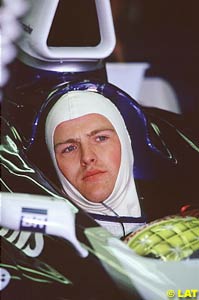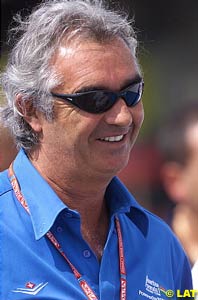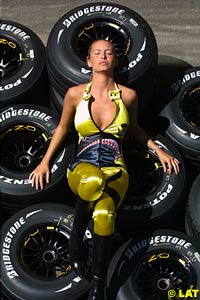
This week's Grapevine brings you |
It's been something of an up/down weekend for Ralf Schumacher, as he sailed through qualifying to record his first Formula One pole position – on his birthday, of all days – before being beset with problems in the race.
On the politically astute front, the softer tyre gave Schumacher an opportunity for Michelin's first pole position, strategically, at Magny Cours. Being, undoubtedly, the fastest Michelin runner at this time, the pressure to go for the qualifying result at the risk of a race win was huge: the F1 fraternity has been waiting for it to happen, and this was certainly a good time. In return, Schumacher now believes he had something of a raw deal in the race, as the second set of Michelins did not work as well as the others. Had this, and a slow first pitstop, not been the case, then he believes Montoya would not have even been in a position to pass him, and a fight for the lead with his brother could have been on the cards.
Having just signed with Williams a contract extention to the end of 2004, there is little danger of public censure from the team over poor teamwork. It's not as though it made any difference to the score line, after all, with Montoya retiring before the race ended. However, there is now an element of tension in the team: if Schumacher refuses to obey team orders, then Montoya is precisely the personality to attempt to enforce them on track, regardless of consequences. He has had a word with his engineer, making it perfectly known that, this year, being nowhere in the Championship, there was little to gain from pressuring a teammate who is due a pitstop. However, had the race win been in question, then Montoya would have picked a corner and taken the inside of Schumacher, presenting him with the option to crash both cars out or take to the grass. This uncompromising statement could be simple bluster, but no-one at Williams thinks so...
Flavio Briatore's star could be fading – at least from Renault's point of view, according to the rumours floating around at Magny Cours.
At the time, Benetton appeared to raise their game, immediately picking up a sense of purpose, as they worked towards 2002. Briatore signed Gascoyne, who was supposed to put together a package to blaze the next steps of the trail this year; at the same time, Renault brought out their "revolutionary" 111 degree engine, looking for plenty of test mileage and racing experience ahead of the final product. Briatore signed Button for two years, at tremendous expense from Williams, and promised the services of Jarno Trulli, should Fisichella continue to appear lacklustre.
All has not gone to script. The chassis does not integrate well with the engine and is fundamentally lacking rigidity. The engine itself is doing well for a prototype unit, but is de-tuned in an attempt to establish reliability. This clearly does not help matters in race conditions. And lastly, Button's signing no longer looks like a coup, as Fisichella has comprehensively out-performed the Briton all year.
The sum of these issues adds up to a worrying total for Renault. They are seeing the team struggling for morale, as they appear to go backwards. The technical team is producing something that doesn't work very well, and at least one of the drivers looks like a dud, for all his rookie performance in a Williams. And this, it seems, is the root of all the rumours of Briatore's departure, as he seems ready to jump, or be pushed, from the boat.
Not that the flamboyant Italian would struggle too much over it, anyway: it seems he is prepared to step into Prost-Acer by buying a stake in Asiatech, the departing Arrows engine supplier, and taking them to Prost, who is struggling to pay their Ferrari bills.
Earlier on this year, Bridgestone were struggling to ensure teams had consistent rubber at races, and gave ground up to Michelin hand over fist attempting to rectify their problems.
Bridgestone, working principally with Ferrari and Jordan on quality control, have established new criteria for consistency between tyres. Additionally, they identified a potential loop-hole in the production process which could, but probably did not, lend itself to spot weaknesses in the tyres and a slow puncture. This has been resolved.
The work on reliability has taken a toll on development time available at the track, effectively giving Michelin a chance to close the performance gap. However, research into new compounds and construction has not been missing: new avenues are being pursued, and the latest compounds are a significant step forward.
Much more importantly, the R&D guys did not let lack of track time stop them from making some form of progress. As a result, Bridgestone were able to make a good step forward for the French Grand Prix, and as the built up development rubber sees track time, they are expecting to take further evolutions to over half of the remaining races.
![]() Ralf's Mixed Weekend
Ralf's Mixed Weekend
 Most controversal was an apparent "radio failure" he endured when asked by the team to move over for teammate Juan Montoya. Having been very unhappy himself about following Damon Hill home when the Briton won Jordan's first Grand Prix in Belgium two years ago, it takes little imagination to see Ralf Schumacher bridling at being on the receiving end of team orders again. Rubbing salt into the wounds, was Montoya's adamant assertion after qualifying that the harder Michelin tyres were the only correct way to go, asserting Schumacher had made the wrong decision. After three years of out-performing his teammates in all areas, Schumacher felt he did not require a lesson in race-craft from a rookie, no matter how successful or promising he is.
Most controversal was an apparent "radio failure" he endured when asked by the team to move over for teammate Juan Montoya. Having been very unhappy himself about following Damon Hill home when the Briton won Jordan's first Grand Prix in Belgium two years ago, it takes little imagination to see Ralf Schumacher bridling at being on the receiving end of team orders again. Rubbing salt into the wounds, was Montoya's adamant assertion after qualifying that the harder Michelin tyres were the only correct way to go, asserting Schumacher had made the wrong decision. After three years of out-performing his teammates in all areas, Schumacher felt he did not require a lesson in race-craft from a rookie, no matter how successful or promising he is.
![]() Briatore Making News
Briatore Making News
 Briatore's sudden appearance at Benetton for the Brazilian Grand Prix last year publicly marked Renault's official return to the sport and demonstrated their commitment, in bringing back the man who had previously run Benetton at the top. Briatore's brief was simple: he had nearly two years to ensure the right people were in the right places, in anticipation of a free-fall budget and wins galore when Renault nailed their colours to the mast next year.
Briatore's sudden appearance at Benetton for the Brazilian Grand Prix last year publicly marked Renault's official return to the sport and demonstrated their commitment, in bringing back the man who had previously run Benetton at the top. Briatore's brief was simple: he had nearly two years to ensure the right people were in the right places, in anticipation of a free-fall budget and wins galore when Renault nailed their colours to the mast next year.
![]() Tyre War Hots Up
Tyre War Hots Up
 As it happens, the issues were not simple to identify, but appear to have been easy to solve. There was no one element which was at fault in the tyres, but very minor variations in the manufacturing process appeared to have a significant effect on the cars using the rubber. It transpires that the current Formula One specification makes the cars so sensitive to their tyres, that a each tyre has to be constructed practically identically, or the variance puts out the car setup significantly. Putting this into perspective, if one in twenty-five tyres is affected, then one or two of the drivers' qualifying or race runs is going to be upset.
As it happens, the issues were not simple to identify, but appear to have been easy to solve. There was no one element which was at fault in the tyres, but very minor variations in the manufacturing process appeared to have a significant effect on the cars using the rubber. It transpires that the current Formula One specification makes the cars so sensitive to their tyres, that a each tyre has to be constructed practically identically, or the variance puts out the car setup significantly. Putting this into perspective, if one in twenty-five tyres is affected, then one or two of the drivers' qualifying or race runs is going to be upset.
Please Contact Us for permission to republish this or any other material from Atlas F1.
|
Volume 7, Issue 27
Atlas F1 Exclusive
Interview with Gascoyne
Behind the Scenes of
'The Fast and the Furious'
French GP Review
The French GP Review
Reflections from Magny Cours
Surprise Surprise
Down with Downforce
Columns
The F1 Insider
Season Strokes - the GP Cartoon
Qualifying Differentials
The Weekly Grapevine
> Homepage |
